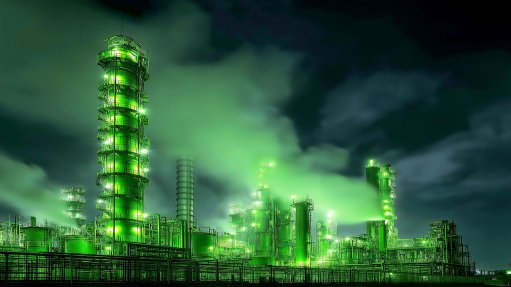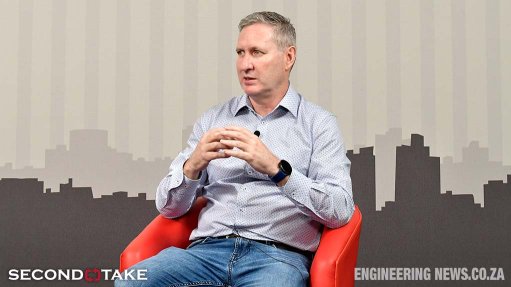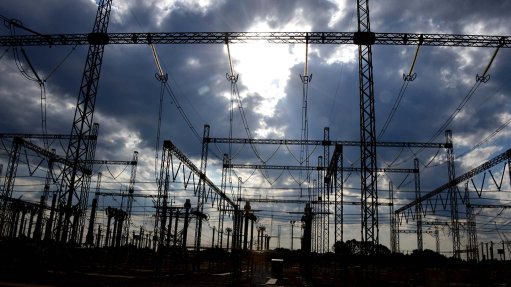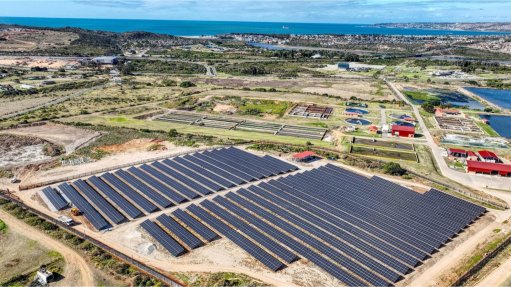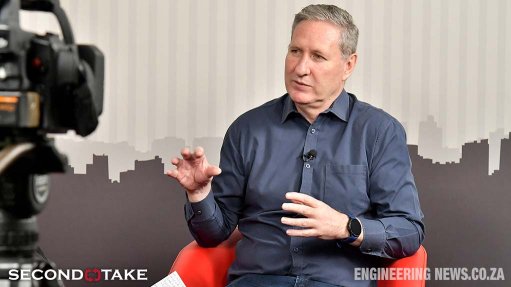IATA is urging governments to prioritise the production of sustainable aviation fuels
The production of sustainable aviation fuels (SAF) is not receiving the priority it needs, the International Air Transport Association (IATA) has warned. SAF is essential if commercial aviation is to achieve net-zero carbon emissions status by 2050. (IATA is the global representative body for the airline industry.)
SAF production this year was more than 100% greater than last year, the association highlighted. While total SAF production in 2022 came to 300-million litres, or 0.25 Mt, this year’s production is estimated at more than 600-million litres, or 0.5 Mt. But SAF production this year accounted for only 3% of the global total renewable fuel production; in other words, 97% of renewable fuel production went to other sectors.
IATA expects global SAF production to total 1.875-billion litres, or 1.5 Mt, next year – a tripling of production over this year. But it would still amount to only 6% of total renewable fuels output and would provide a mere 0.53% of aviation’s fuel needs. Most of the new renewable fuel production capacity that came on stream this year has been allocated to the production of non-aviation fuels. Such low production levels also keep the prices of SAF high.
Governments will have to act to ensure that SAF production gets the priority it needs, affirms IATA. Indeed, governments will have to encourage greater SAF production to reach the interim target of cutting aviation carbon emissions by 5% by 2030, set at the recent Third Conference on Aviation Alternative Fuels. Achieving this target will require the production of 17.5-billion litres, or 14 Mt, of SAF, a year.
“Aviation needs between 25% and 30% of renewable fuel production capacity for SAF,” highlights IATA director-general Willie Walsh. “At those levels aviation will be on the trajectory needed to reach net-zero carbon emissions by 2050. Until such levels are reached, we will continue missing huge opportunities to advance aviation’s decarbonisation. It is government policy that will make the difference. Governments must prioritise policies to incentivise the scaling-up of SAF production and to diversify feedstocks with those available locally.”
The demand for SAF has been clearly shown, IATA points out. Every drop of SAF so far produced has been bought and used. Buying SAF actually added $756-million to airlines’ fuel bills this year, and 2023 has been a year of record high conventional jet fuel prices. So far, at least 43 airlines have entered agreements to buy about 16.25-million litres (13 Mt) of SAF next year. And more such agreements are being regularly announced.
The association is calling for governments to adopt and implement effective incentives for SAF production. Such incentives should encourage accelerating investment in SAF production by traditional oil companies; ensure that incentives for renewable fuel production encourage the production of the required quantities of SAF; and make certain that stakeholders focus on regionally-diversifying their SAF feedstocks and SAF production. Incentives should also support the identification and prioritisation, for investment support, of projects with potentially high SAF production. Last but far from least, governments have to agree on and establish a global SAF accounting framework.
Also important will be the diversification of SAF feedstocks and production methods. Over the next five years, some 85% of SAF will be made from hydrotreated esters and fatty acids (better known as HEFA). These come from used cooking oil, inedible animal fats and industrial grease. But the supply of these feedstocks is limited. The required ramping up of SAF production will require the use of other feedstocks and other production processes.
IATA is urging governments to encourage increasing SAF production using already certified alternatives to HEFA technology, such as Alcohol-to-Jet and Fischer-Tropsch technologies. These use biological and agricultural wastes and residues as feedstocks. Further, governments should fast-track the certification of, and investment in, new SAF production methods currently being developed. They should also encourage the identification of a wider range of potential SAF feedstocks, to allow both feedstock diversification and regional alternatives, especially feedstock options with ancillary benefits, such as environmental restoration.
Article Enquiry
Email Article
Save Article
Feedback
To advertise email advertising@creamermedia.co.za or click here
Comments
Announcements
What's On
Subscribe to improve your user experience...
Option 1 (equivalent of R125 a month):
Receive a weekly copy of Creamer Media's Engineering News & Mining Weekly magazine
(print copy for those in South Africa and e-magazine for those outside of South Africa)
Receive daily email newsletters
Access to full search results
Access archive of magazine back copies
Access to Projects in Progress
Access to ONE Research Report of your choice in PDF format
Option 2 (equivalent of R375 a month):
All benefits from Option 1
PLUS
Access to Creamer Media's Research Channel Africa for ALL Research Reports, in PDF format, on various industrial and mining sectors
including Electricity; Water; Energy Transition; Hydrogen; Roads, Rail and Ports; Coal; Gold; Platinum; Battery Metals; etc.
Already a subscriber?
Forgotten your password?
Receive weekly copy of Creamer Media's Engineering News & Mining Weekly magazine (print copy for those in South Africa and e-magazine for those outside of South Africa)
➕
Recieve daily email newsletters
➕
Access to full search results
➕
Access archive of magazine back copies
➕
Access to Projects in Progress
➕
Access to ONE Research Report of your choice in PDF format
RESEARCH CHANNEL AFRICA
R4500 (equivalent of R375 a month)
SUBSCRIBEAll benefits from Option 1
➕
Access to Creamer Media's Research Channel Africa for ALL Research Reports on various industrial and mining sectors, in PDF format, including on:
Electricity
➕
Water
➕
Energy Transition
➕
Hydrogen
➕
Roads, Rail and Ports
➕
Coal
➕
Gold
➕
Platinum
➕
Battery Metals
➕
etc.
Receive all benefits from Option 1 or Option 2 delivered to numerous people at your company
➕
Multiple User names and Passwords for simultaneous log-ins
➕
Intranet integration access to all in your organisation






